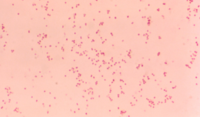
Photo from wikipedia
Abstract Background Salmonella enterica subspecies enterica serovar Oranienburg (SO) is a foodborne pathogen but rarely causes systemic infections such as bacteremia. Between July and September 2018, bacteremia cases caused by… Click to show full abstract
Abstract Background Salmonella enterica subspecies enterica serovar Oranienburg (SO) is a foodborne pathogen but rarely causes systemic infections such as bacteremia. Between July and September 2018, bacteremia cases caused by SO were identified in 12 persons without any underlying medical conditions in the southern Kyushu area of Japan. Methods Randomly amplified polymorphic DNA (RAPD) analysis was performed to investigate the genetic similarity of the 12 bacteremia-related strains and other Japanese isolates. Furthermore, a series of whole-genome sequence (WGS)–based phylogenetic analyses was performed with a global SO strain set (n = 1648). Results The resolution power of RAPD was insufficient to investigate the genetic similarity between the bacteremia-related strains and other strains. WGS-based phylogenetic analyses revealed that the bacteremia-related strains formed a tight cluster along with 2 strains isolated from asymptomatic carriers in 2018 in the same area, with a maximum within-cluster single-nucleotide polymorphism (SNP) distance of 11. While several strains isolated in the United States and the United Kingdom were found to be closely related to the bacteremia-related strains, 2 strains isolated in 2016 in the southern Kyushu area were most closely related, with SNP distances of 4–11 and 5–10, and had the same plasmids as the bacteremia-related strains. Conclusions The 12 bacteremia cases identified were caused by a single SO clone. As none of the bacteremia patients had any underlying diseases, this clone may be prone to cause bacteremia. Although further analyses are required to understand its virulence, particular attention should be given to this clone and its close relatives in the surveillance of nontyphoidal salmonellae.
Journal Title: Open Forum Infectious Diseases
Year Published: 2022
Link to full text (if available)
Share on Social Media: Sign Up to like & get
recommendations!